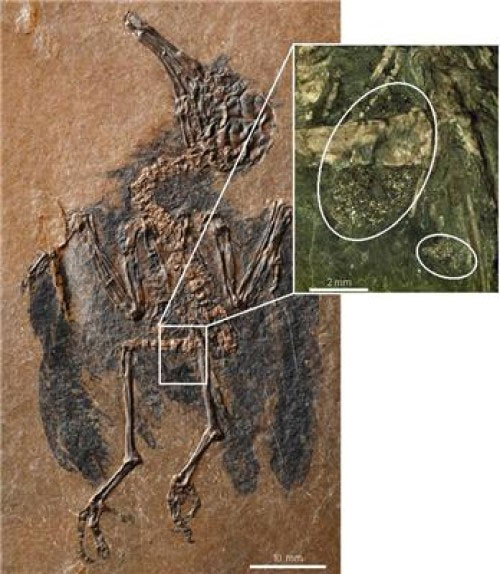Fossil birds pollinate plants
Scientists at the Senckenberg Research Institute in Frankfurt (Germany) have described a supposedly oldest fossil bird compared to previously collected specimens of a plant pollinating a plant.
Thanks to the fossil's stomach, it is preserved well over time, so scientists discovered and determined to contain a variety of pollen from different plants. The dating shows at least the link between flowers and birds from 47 million years ago.

Fossil birds pollinate plants
This fossil bird was collected from the area known as the "Missel Pit" (Germany), which once collected many famous fossils. The full article has been published in Biology Letters.
This bird flies from one flower to the other, with its slender beak that helps pollinate plants, which is very important to help plants reproduce. Particularly in tropical and subtropical regions, birds also participate in pollination for plants equally active as insects.
Science Daily quoted Dr. Gerald Mayr as saying there was a suggestion of a bird's pollinated body but there was no concrete evidence like this fossil.
So far only a few samples of hummingbirds that lived about 30 million years ago provide rather vague evidence that vertebrates help plants reproduce.
Fossil samples dating back 47 million years show that many pollen grains of different sizes are well preserved in its body.
- Found fossils of ancient birds after dinosaurs extinction
- Detecting fossil fossils strange 99 million years in amber
- Detection of the first chrysanthemum fossil specimen contained many toxicity
- Ancestors of birds - Archeopteryx
- Flowers born to seduce birds
- For the first time, an ancient bird fossil was discovered in the Middle Ages
- Decoding fossil birds discovered the unknown species on Earth
- The intact fossil after 120 million years reveals a mysterious loss of prehistoric animals
- The most intact bird fossil in amber 99 million years
- Displaying the oldest fossil samples in history in Brazil
- Bees pollinate on Mars: Can you believe it?
- Unexpected findings about the wisdom of plants and animals
 Discovered an ancient centipede fossil 99 million years old
Discovered an ancient centipede fossil 99 million years old Discovered bat-like dinosaurs in China
Discovered bat-like dinosaurs in China Discovered a 200-year-old bronze cannon of the coast
Discovered a 200-year-old bronze cannon of the coast Discover 305 million-year-old spider fossils
Discover 305 million-year-old spider fossils Top 5 plants with special abilities
Top 5 plants with special abilities  Mushrooms - The silent 'architects' of nature
Mushrooms - The silent 'architects' of nature  Technology of growing plants in the dark
Technology of growing plants in the dark  We are about to understand the language of trees.
We are about to understand the language of trees.  Can animals heal themselves?
Can animals heal themselves?  Do fake plants make us feel good?
Do fake plants make us feel good? 